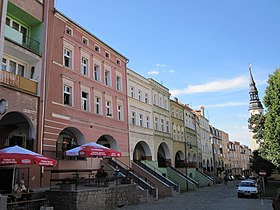Bolków
Bolków | |
|---|---|
 View over the town with the medievalcastle | |
| Coordinates:50°56′N16°6′E/ 50.933°N 16.100°E | |
| Country | |
| Voivodeship | Lower Silesian |
| County | Jawor |
| Gmina | Bolków |
| City rights | 1276 |
| Area | |
| • Total | 7.68 km2(2.97 sq mi) |
| Elevation | 380 m (1,250 ft) |
| Population (30 June 2021[1]) | |
| • Total | 4,864 |
| • Density | 630/km2(1,600/sq mi) |
| Time zone | UTC+1(CET) |
| • Summer (DST) | UTC+2(CEST) |
| Postal code | 59-420 |
| Area code | +48 75 |
| Car plates | DJA |
| Website | http://www.bolkow.pl |
Bolków[ˈbɔlkuf](German:Bolkenhain) is a town inJawor County,Lower Silesian Voivodeship,in south-westernPoland.It is the seat of the administrative district (gmina) calledGmina Bolkówand part of theNeisse-Nysa-NisaEuroregion.
Overview
[edit]The town lies at theNysa SzalonaRiver, approximately 15 kilometres (9 mi) south-west ofJawor,and 70 kilometres (43 mi) west of the regional capitalWrocław.it is located within the historic region ofLower Silesia.As of June 2021, it has a population of 4,864.[1]
History
[edit]
In theMiddle AgesBolków was a small settlement within the fragmentedPolish Kingdom,it was first mentioned asHainand grantedtown rightsin 1276. The oldest known mention of theBolków Castledates back to 1277 and the reign of Polish DukeBolesław II Rogatka.[2]It was significantly expanded by his son, DukeBolko I the Strict.[2]During the reign of Bolko's successors,Bernard of ŚwidnicaandBolko II the Small,the castle became one of the most powerful strongholds inSilesiaand a treasury was also located in it.[2]The town's current name was given by DukeBernard of Świdnica,under whose rule it developed rapidly, to commemorate his father DukeBolko I the Strict.[3]In 1345 it was successfully defended by Poles during a Czech siege.[2]It remained part of thePiast-ruledDuchy of Świdnicauntil its dissolution in 1392, when it was incorporated into theCzech Crown Lands[3]of the multi-ethnicHoly Roman Empire.
In 1463 the castle was captured by the Czech KingGeorge of Poděbradyand afterwards it became the home of local bandits, before being captured by the burghers ofWrocławandŚwidnicain 1468.[2]Afterwards the town passed to theKingdom of Hungary,in 1493 it was captured byCasimir II, Duke of Cieszynof thePiast dynasty,and later it came back under Czech rule.
The town and castle, devastated in theThirty Years' War,became a property ofKrzeszów Abbeyin 1703.[3]During theSilesian Wars,in the mid-18th century the town was annexed byPrussiaand, subsequently, in 1871 became part of Germany. Aftersecularization,from 1810 the castle was abandoned and slowly deteriorated.[3]Restoration efforts of the castle did not begin until 1905.
DuringWorld War IIthe Germans established a subcamp of theGross-Rosen concentration campforJews.[3]
A training camp for Jewish volunteers toHaganawas established in 1947 in Bolków. The camp trained 7000 soldiers who then traveled toPalestineand it existed until the end of 1948.[4]
Since 1997 theBolków Castleis the site of the annual "Castle Party"Gothic rockfestival.
Sights
[edit]The most notable landmark of the town is the medievalBolków Castle,dating back to the 13th century. Other sights include the town hall, Church of Saint Hedwig, the Market Square filled with colourful townhouses, and other historic buildings and structures.
-
Bolków Castlecourtyard
-
Church of Saint Hedwig
-
Niepodległości Street with the town hall in the background
-
Baroque chapel
Notable people
[edit]
- Herbert Puschmann(1920–1944),Luftwaffepilot
- Heinrich Windelen(1921–2015), German politician
Twin towns – sister cities
[edit]Seetwin towns of Gmina Bolków.
References
[edit]- ^ab"Local Data Bank".Statistics Poland.Retrieved2022-06-01.Data for territorial unit 0205024.
- ^abcde"Historia Zamku".Zamek Bolków(in Polish). Archived fromthe originalon 18 April 2021.Retrieved12 February2020.
- ^abcde"Historia".Gmina Bolków(in Polish). Archived fromthe originalon 22 October 2019.Retrieved12 February2020.
- ^"Hagana's training camp in Bolkow".Archived fromthe originalon 2015-10-19.Retrieved2015-04-25.








